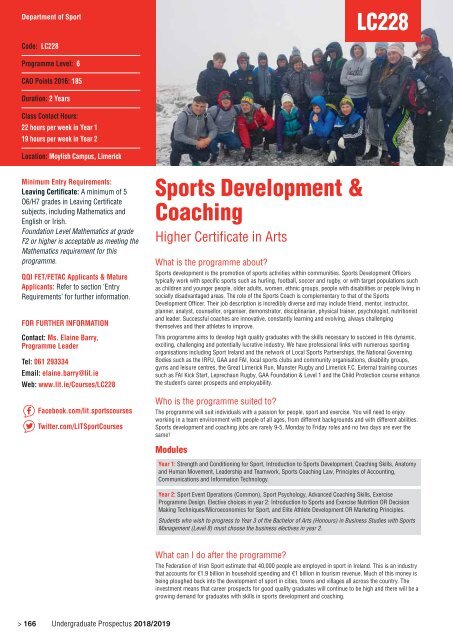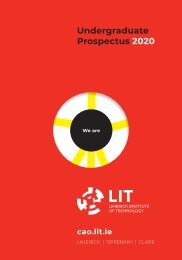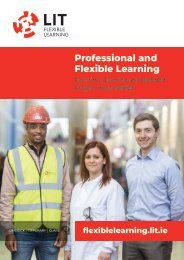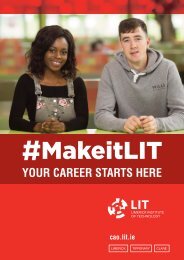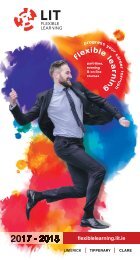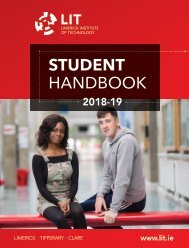LIT_fulltime2017
You also want an ePaper? Increase the reach of your titles
YUMPU automatically turns print PDFs into web optimized ePapers that Google loves.
Department of Sport<br />
LC228<br />
Code: LC228<br />
Programme Level: 6<br />
CAO Points 2016: 185<br />
Duration: 2 Years<br />
Class Contact Hours:<br />
22 hours per week in Year 1<br />
19 hours per week in Year 2<br />
Location: Moylish Campus, Limerick<br />
Minimum Entry Requirements:<br />
Leaving Certificate: A minimum of 5<br />
O6/H7 grades in Leaving Certificate<br />
subjects, including Mathematics and<br />
English or Irish.<br />
Foundation Level Mathematics at grade<br />
F2 or higher is acceptable as meeting the<br />
Mathematics requirement for this<br />
programme.<br />
QQI FET/FETAC Applicants & Mature<br />
Applicants: Refer to section ‘Entry<br />
Requirements’ for further information.<br />
FOR FURTHER INFORMATION<br />
Contact: Ms. Elaine Barry,<br />
Programme Leader<br />
Tel: 061 293334<br />
Email: elaine.barry@lit.ie<br />
Web: www.lit.ie/Courses/LC228<br />
Facebook.com/lit.sportscourses<br />
Twitter.com/<strong>LIT</strong>SportCourses<br />
Sports Development &<br />
Coaching<br />
Higher Certificate in Arts<br />
What is the programme about?<br />
Sports development is the promotion of sports activities within communities. Sports Development Officers<br />
typically work with specific sports such as hurling, football, soccer and rugby, or with target populations such<br />
as children and younger people, older adults, women, ethnic groups, people with disabilities or people living in<br />
socially disadvantaged areas. The role of the Sports Coach is complementary to that of the Sports<br />
Development Officer. Their job description is incredibly diverse and may include friend, mentor, instructor,<br />
planner, analyst, counsellor, organiser, demonstrator, disciplinarian, physical trainer, psychologist, nutritionist<br />
and leader. Successful coaches are innovative, constantly learning and evolving, always challenging<br />
themselves and their athletes to improve.<br />
This programme aims to develop high quality graduates with the skills necessary to succeed in this dynamic,<br />
exciting, challenging and potentially lucrative industry. We have professional links with numerous sporting<br />
organisations including Sport Ireland and the network of Local Sports Partnerships, the National Governing<br />
Bodies such as the IRFU, GAA and FAI, local sports clubs and community organisations, disability groups,<br />
gyms and leisure centres, the Great Limerick Run, Munster Rugby and Limerick F.C. External training courses<br />
such as FAI Kick Start, Leprechaun Rugby, GAA Foundation & Level 1 and the Child Protection course enhance<br />
the student’s career prospects and employability.<br />
Who is the programme suited to?<br />
The programme will suit individuals with a passion for people, sport and exercise. You will need to enjoy<br />
working in a team environment with people of all ages, from different backgrounds and with different abilities.<br />
Sports development and coaching jobs are rarely 9-5, Monday to Friday roles and no two days are ever the<br />
same!<br />
Modules<br />
Year 1: Strength and Conditioning for Sport, Introduction to Sports Development, Coaching Skills, Anatomy<br />
and Human Movement, Leadership and Teamwork, Sports Coaching Law, Principles of Accounting,<br />
Communications and Information Technology.<br />
Year 2: Sport Event Operations (Common), Sport Psychology, Advanced Coaching Skills, Exercise<br />
Programme Design. Elective choices in year 2: Introduction to Sports and Exercise Nutrition OR Decision<br />
Making Techniques/Microeconomics for Sport, and Elite Athlete Development OR Marketing Principles.<br />
Students who wish to progress to Year 3 of the Bachelor of Arts (Honours) in Business Studies with Sports<br />
Management (Level 8) must choose the business electives in year 2.<br />
What can I do after the programme?<br />
The Federation of Irish Sport estimate that 40,000 people are employed in sport in Ireland. This is an industry<br />
that accounts for €1.9 billion in household spending and €1 billion in tourism revenue. Much of this money is<br />
being ploughed back into the development of sport in cities, towns and villages all across the country. The<br />
investment means that career prospects for good quality graduates will continue to be high and there will be a<br />
growing demand for graduates with skills in sports development and coaching.<br />
> 166 Undergraduate Prospectus 2018/2019


